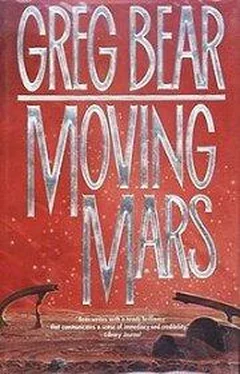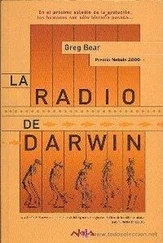Greg Bear - Moving Mars
Здесь есть возможность читать онлайн «Greg Bear - Moving Mars» весь текст электронной книги совершенно бесплатно (целиком полную версию без сокращений). В некоторых случаях можно слушать аудио, скачать через торрент в формате fb2 и присутствует краткое содержание. Год выпуска: 1993, ISBN: 1993, Издательство: Tor Books, Жанр: Космическая фантастика, на английском языке. Описание произведения, (предисловие) а так же отзывы посетителей доступны на портале библиотеки ЛибКат.
- Название:Moving Mars
- Автор:
- Издательство:Tor Books
- Жанр:
- Год:1993
- ISBN:0-312-85515-X
- Рейтинг книги:4 / 5. Голосов: 1
-
Избранное:Добавить в избранное
- Отзывы:
-
Ваша оценка:
- 80
- 1
- 2
- 3
- 4
- 5
Moving Mars: краткое содержание, описание и аннотация
Предлагаем к чтению аннотацию, описание, краткое содержание или предисловие (зависит от того, что написал сам автор книги «Moving Mars»). Если вы не нашли необходимую информацию о книге — напишите в комментариях, мы постараемся отыскать её.
Won Nebula Award for Best Novel in 1994.
Nominated for Hugo, Locus, and John F. Campbell Memorial Awards in 1994.
Moving Mars — читать онлайн бесплатно полную книгу (весь текст) целиком
Ниже представлен текст книги, разбитый по страницам. Система сохранения места последней прочитанной страницы, позволяет с удобством читать онлайн бесплатно книгу «Moving Mars», без необходимости каждый раз заново искать на чём Вы остановились. Поставьте закладку, и сможете в любой момент перейти на страницу, на которой закончили чтение.
Интервал:
Закладка:
Moving Mars
by Greg Bear
For Ray Bradbury
A day on Mars is a little longer than a day on Earth: 24 hours and 40 minutes. A year on Mars is less than two Earth years: 686 Earth days, or 668 Martian days. Mars is 6,787 kilometers in diameter, compared to Earth’s 12,756 kilometers. Its gravitational acceleration is 3.71 meters per second squared, or just over one-third of Earth’s. The atmospheric pressure at the surface of Mars averages 5.6 millibars, about one-half of one percent of Earth’s. The atmosphere is largely composed of carbon dioxide. Temperatures at the “datum” or reference surface level (there is no “sea level,” as there are presently no seas) vary from -130° to +27° Celsius. An unprotected human on the surface of Mars would very likely freeze within minutes, but first would die of exposure to the near-vacuum. If this unfortunate human survived freezing and low pressure, and found a supply of oxygen to breathe, she would still be endangered by high levels of radiation from the sun and elsewhere .
After Earth, Mars is the most hospitable planet in the Solar System.
Part One
The young may not remember Mars of old, under the yellow Sun, its cloud-streaked skies dusted pink, its soil rusty and fine, its inhabitants living in pressurized burrows and venturing Up only as a rite of passage or to do maintenance or tend the ropy crops spread like nests of intensely green snakes over the wind-scoured farms. That Mars, an old and tired Mars filled with young lives, is gone forever.
Now I am old and tired, and Mars is young again.
Our lives are not our own, but by God, we must behave as if they are. When I was young, what I did seemed too small to be of any consequence; but the shiver of dust, we are told, expands in time to the planet-sweeping storm…
An age was coming to an end. I had studied the signs half-innocently in my classes, there had even been dire hints from a few perceptive professors, but I had never thought the situation would affect me personally… Until now.
I had been voided from the University of Mars , Sinai. Two hundred classmates and professors in the same predicament lined the brilliant white floor of the depot, faces crossed by shadows from sun shining through the webwork of beams and girders supporting the depot canopy. We were waiting for the Soils Dorsa train to come and swift us away to our planums, planitias, fossas, and valleys.
Diane Johara, my roommate, stood with her booted foot on one small bag, tapping the tip of the boot on the handle, lips pursed as if whistling but making no sound. She kept her face pointed toward the northern curtains, waiting for the train to nose through. Though we were good friends, Diane and I had never talked politics. That was basic etiquette on Mars.
“Assassination,” she said.
“Impractical,” I murmured. I had not known until a few days ago how strongly Diane felt. “Besides, who would you shoot?”
“The governor. The chancellor.”
I shook my head.
Over eighty percent of the UMS students had been voided, a gross violation of contract. That struck me as very damned unfair, but my family had never been activist. Daughter of BM finance people, born to a long tradition of caution, I straddled the fence.
The political structure set up during settlement a century before still creaked along, but its days were numbered. The original settlers, arriving in groups of ten or more families, had dug warrens in water-rich lands all over Mars, from pole to pole, but mostly in the smooth lowland plains and the deep valleys. Following the Lunar model, the first families had formed syndicates called Binding Multiples or BMs. The Binding Multiples acted like economic super-families; indeed, “family” and “BM” were almost synonymous. Later settlers had a choice of joining established BMs or starting new ones; few families stayed independent.
Many BMs merged and in time agreed to divide Mars into areological districts and develop resources in cooperation. By and large, Binding Multiples regarded each other as partners in the midst of Martian bounty, not competitors.
“The train’s late. Fascists are supposed to make them run on time,” Diane said, still tapping her boot.
“They never did on Earth,” I said.
“You mean it’s a myth?”
I nodded.
“So fascists aren’t good for anything?” Diane asked.
“Uniforms,” I said.
“Ours don’t even have good uniforms.”
Elected by district ballot, the governors answered only to the inhabitants of their districts, regardless of BM affiliations. The governors licensed mining and settlement rights to the BMs and represented the districts in a joint Council of Binding Multiples. Syndics chosen within BMs by vote of senior advocates and managers represented the interests of the BMs themselves in the Council. Governors and syndics did not often see eye to eye. It was all very formal and polite — Martians are almost always polite — but many procedures were uncodified. Some said it was grossly inefficient, and attempts were being made to unify Mars under a central government, as had already happened on the Moon.
The governor of Syria-Sinai, Freechild Dauble, a tough, chisel-chinned administrator, had pushed hard for several years to get the BMs to agree to a Statist constitution and central government authority. She wanted them to give up their syndics in favor of representation by district. This meant the breakup of BM power, of course.
Dauble’s name has since become synonymous with corruption, but at the time, she had been governor of Mars’s largest district for eight Martian years and was at the peak of her long friendship with power. By cajoling, pressuring, and threatening, she had forged — some said forced — agreements between the largest BMs. Dauble had become the focus of Martian Unity and was on the sly spin for president of the planet.
Some said Dauble’s own career was the best argument for change, but few dared contradict her.
A vote was due within days in the Council to make permanent the new Martian constitution. We had lived under the Dauble government’s “trial run” for six months, and many grumbled loudly. The hard-won agreement was fragile. Dauble had rammed it down too many throats, with too much underhanded dealing.
Lawsuits were pending from at least five families opposed to unity, mostly smaller BMs afraid of being absorbed and nullified. They were called Gobacks by the Statists, who regarded them as a real threat. The Statists would not tolerate a return to what they saw as disorganized Binding Multiples rule.
“If assassination is so impractical,” Diane said, “we could rough up a few of the favorites — ”
“Shh,” I said.
She shook her short, shagged hair and turned away, soundlessly whistling again. Diane did that when she was too angry to speak politely. Red rabbits who had lived for decades in close quarters placed a high value on politeness, and impressed that on their offspring.
The Statists feared incidents. Student protests were unacceptable to Dauble. Even if the students did not represent the Gobacks, they might make enough noise to bring down the agreement.
So Dauble sent word to Caroline Connor, an old friend she had appointed chancellor of the largest university, University of Mars Sinai . An authoritarian with too much energy and too little sense, Connor obliged her crony by closing most of the campus and compiling a list of those who might be in sympathy with protesters.
I had majored in government and management. Though I had signed no petitions and participated in no marches — unlike Diane, who had taken to the movement vigorously — my name crept onto a list of suspects. The Govmanagement Department was notoriously independent; who could trust any of us?
Читать дальшеИнтервал:
Закладка:
Похожие книги на «Moving Mars»
Представляем Вашему вниманию похожие книги на «Moving Mars» списком для выбора. Мы отобрали схожую по названию и смыслу литературу в надежде предоставить читателям больше вариантов отыскать новые, интересные, ещё непрочитанные произведения.
Обсуждение, отзывы о книге «Moving Mars» и просто собственные мнения читателей. Оставьте ваши комментарии, напишите, что Вы думаете о произведении, его смысле или главных героях. Укажите что конкретно понравилось, а что нет, и почему Вы так считаете.












